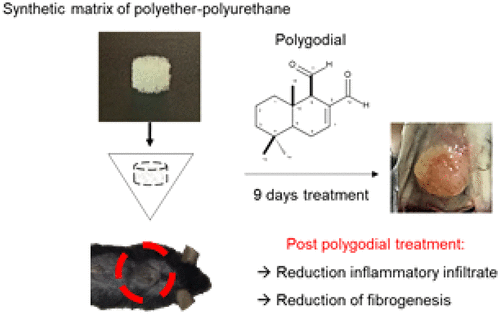当前位置:
X-MOL 学术
›
J. Nat. Prod.
›
论文详情
Our official English website, www.x-mol.net, welcomes your
feedback! (Note: you will need to create a separate account there.)
Sesquiterpene Polygodial from Drimys brasiliensis (Winteraceae) Down-Regulates Implant-Induced Inflammation and Fibrogenesis in Mice
Journal of Natural Products ( IF 3.3 ) Pub Date : 2020-11-24 , DOI: 10.1021/acs.jnatprod.0c00958 Bruno Antonio Ferreira 1 , Anderson Ferraz Norton Filho 2 , Simone Ramos Deconte 2 , Tatiana Carla Tomiosso 3 , Fernanda Thevenard 4 , Silvia Passos Andrade 5 , João Henrique Ghilardi Lago 4 , Fernanda de Assis Araújo 2
Journal of Natural Products ( IF 3.3 ) Pub Date : 2020-11-24 , DOI: 10.1021/acs.jnatprod.0c00958 Bruno Antonio Ferreira 1 , Anderson Ferraz Norton Filho 2 , Simone Ramos Deconte 2 , Tatiana Carla Tomiosso 3 , Fernanda Thevenard 4 , Silvia Passos Andrade 5 , João Henrique Ghilardi Lago 4 , Fernanda de Assis Araújo 2
Affiliation

|
Drimys brasiliensis (Winteraceae) has been investigated in traditional medicine for its anti-inflammatory properties to treat gastric ulcers and allergic and respiratory system diseases as well as for cancer treatment. In this work, we investigate the ability of the sesquiterpene polygodial, isolated from D. brasiliensis stem barks, to modulate the chronic inflammatory response induced by polyester-polyurethane sponge implants in C57BL/6J mice. Daily treatment with polygodial inhibited the macrophage content in the implants as determined by the activity of the N-acetyl-β-d-glucosaminidase enzyme as well as decreased the levels of CXCL1/KC and CCL2/JE/MCP-1 pro-inflammatory chemokines and the presence of mast cells along the formed fibrovascular tissue. Similarly, the deposition of a new extracellular matrix (total collagen and type I and III collagen fibers) as well as the production of the TGF-β1 cytokine were attenuated in implants treated with polygodial, showing for the first time its antifibrogenic capacity. The hemoglobin content, the number of newly formed vessels, and the levels of VEGF cytokine, which were used as parameters for the assessment of the neovascularization of the implants, did not change after treatment with polygodial. The anti-inflammatory and antifibrogenic effects of polygodial over the components of the granulation tissue induced by the sponge implant indicate a therapeutic potential for the treatment of inflammatory diseases associated with the development of fibrovascular tissue.
中文翻译:

来自 Drimys brasiliensis (Winteraceae) 的倍半萜多糖下调小鼠植入物诱导的炎症和纤维生成
Drimys brasiliensis(冬科)因其抗炎特性而在传统医学中被研究,以治疗胃溃疡、过敏和呼吸系统疾病以及癌症治疗。在这项工作中,我们研究了从D. brasiliensis茎皮中分离的倍半萜多糖调节 C57BL/6J 小鼠中由聚酯-聚氨酯海绵植入物诱导的慢性炎症反应的能力。根据N-乙酰-β- d的活性确定,每天用多糖苷处理会抑制植入物中的巨噬细胞含量-氨基葡萄糖苷酶以及降低 CXCL1/KC 和 CCL2/JE/MCP-1 促炎趋化因子的水平以及沿着形成的纤维血管组织存在肥大细胞。同样,新的细胞外基质(总胶原蛋白和 I 型和 III 型胶原纤维)的沉积以及 TGF-β1 细胞因子的产生在用 polygodial 处理的植入物中减弱,首次显示其抗纤维化能力。血红蛋白含量、新形成血管的数量和 VEGF 细胞因子的水平,用作评估植入物新血管形成的参数,在用 polygodial 治疗后没有改变。
更新日期:2020-12-24
中文翻译:

来自 Drimys brasiliensis (Winteraceae) 的倍半萜多糖下调小鼠植入物诱导的炎症和纤维生成
Drimys brasiliensis(冬科)因其抗炎特性而在传统医学中被研究,以治疗胃溃疡、过敏和呼吸系统疾病以及癌症治疗。在这项工作中,我们研究了从D. brasiliensis茎皮中分离的倍半萜多糖调节 C57BL/6J 小鼠中由聚酯-聚氨酯海绵植入物诱导的慢性炎症反应的能力。根据N-乙酰-β- d的活性确定,每天用多糖苷处理会抑制植入物中的巨噬细胞含量-氨基葡萄糖苷酶以及降低 CXCL1/KC 和 CCL2/JE/MCP-1 促炎趋化因子的水平以及沿着形成的纤维血管组织存在肥大细胞。同样,新的细胞外基质(总胶原蛋白和 I 型和 III 型胶原纤维)的沉积以及 TGF-β1 细胞因子的产生在用 polygodial 处理的植入物中减弱,首次显示其抗纤维化能力。血红蛋白含量、新形成血管的数量和 VEGF 细胞因子的水平,用作评估植入物新血管形成的参数,在用 polygodial 治疗后没有改变。











































 京公网安备 11010802027423号
京公网安备 11010802027423号